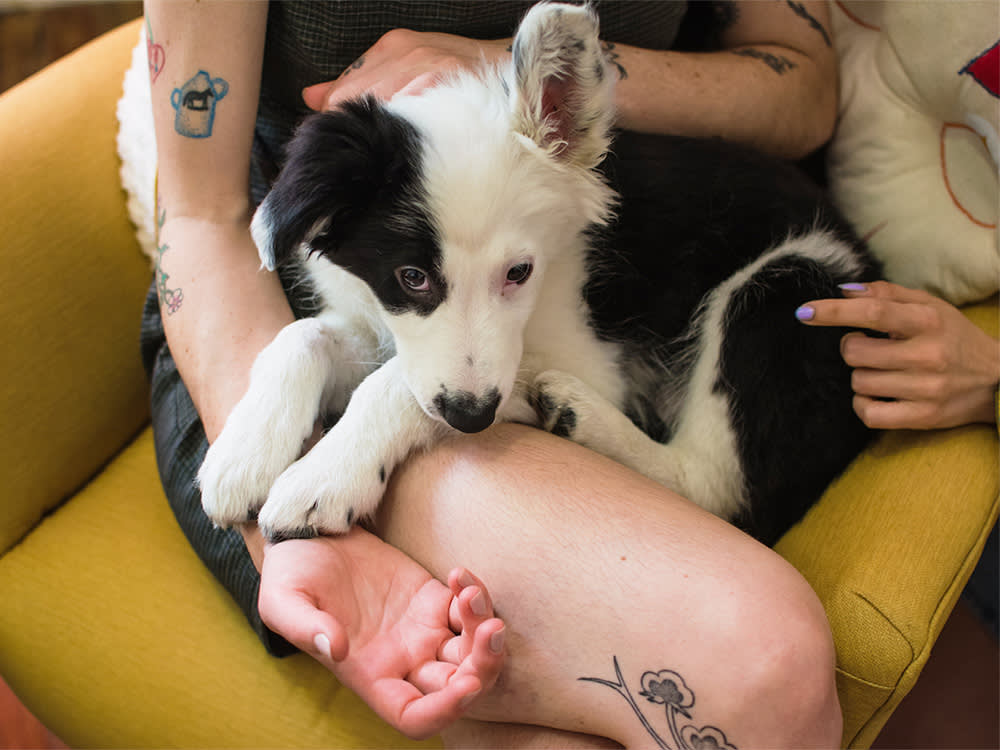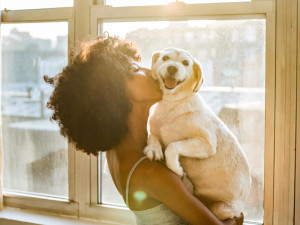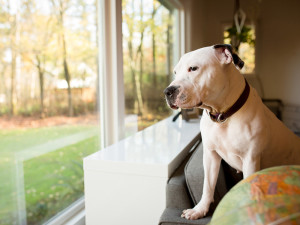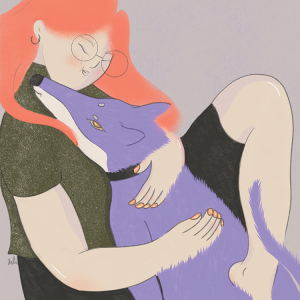Do Anxious Dog Parents Raise More Anxious Dogs?
Which comes first: a nervous person or a nervous pup?

Share Article
OK, so, you’ve always identified as an anxious person. Maybe you were diagnosed when you were young or as an adult. These days, following a global pandemic, record-high student debt, and climate change, there’s a lot to keep our brains whirring at a constant breakneck pace. But, have you ever had anyone suggest that your dog, whose brain, and subsequently, body seems to operate at the same high-energy levels, is that way because of you? It’s not an easy pill to swallow, especially if you’ve spent your whole life trying not to let your anxiety define you, and who are they to suggest that anyway? Rude. It turns out, though, that there might be some scientific truth to that query.
Kim Brophey, author of Meet Your Dog: The Game-Changing Guide to Understanding Your Dog’s Behavioropens in new tab is an applied behavioral ethologist. She specializes in working with dogs who have behavior problems and their parents. When I asked her if dogs who were brought to her canine behavior clinic with anxiety issues tended to have nervous parents, her response was immediate: “Yes, indeed. Dogs belonging to high stress/anxiety clients are often higher than average in their stress levels and exhibit more anxiety or hyperarousal.”
And when I asked Carri Westgarth, author of The Happy Dog Owner opens in new tab(2021) whether she had noticed that fearful, shy dogs tended to have anxious parents, she said, “Absolutely!” These observations are consistent with a growing body of research showing similarities in the personalities of dogs and their parents. The first systematic research on this topic was reported in a 1997 paperopens in new tab by the anthrozoologists Anthony Podberscek and James Serpell.
In their paper they used the “Cattell 16 Personality Factor Questionnaire” — a personality test that was popular at the time. They compared the personalities of pet parents with English Cocker Spaniels who were classified as aggressive with parents of Cocker Spaniels labeled as non-aggressive. They found the parents of aggressive dogs were more likely to be tense, emotionally less stable, shyer, and more undisciplined than parents of dogs without a history of aggression.

The Five-Factor Model of Personality
Over the past couple of decades, personality research has been dominated by the Five-Factor Modelopens in new tab. This is the theory that individual differences in human personality boil down to five basic dimensions: (1) openness to new experiences, (2) conscientiousness, (3) extroversion, (4) agreeableness, and (5) neuroticism. Some researchers now refer to the neuroticism trait as “negative emotionality” or “emotional instability.” And some investigators prefer to reverse the terminology of the neuroticism scale scores and call the trait “emotional stability.” In this case, people who are more anxious are said to have low emotional stability.
Studies Show Nervous Parents Tend to Have Nervous Dogs
Over a dozen studies have now found relationships between at least some Big Five traits in pet parents and the behavior of their pets. The most consistent findings, however, focus on the factor usually labeled “neuroticism.” People who score high on this factor often experience negative emotions such as fear, guilt, anxiety, and stress. Here is a sample of these findings.
A research team led by veterinary behaviorist Nicholas Dodman examined the relationship between Big Five personality traitsopens in new tab of 1,564 dog parents and 17 problematic behaviors in their pets. Parents who scored low on the “emotional stability” trait (had high negative emotionality scores) had dogs that had 13 of the behavior issues. These included aggression directed toward their parents, aggression toward other dogs, fear, attention-seeking and separation anxiety, and persistent barking.
A 2020 studyopens in new tab found that people with dogs who attacked humans or animals had higher negative emotionality scores than parents of non-aggressive dogs.
Researchers opens in new tabat the Clever Dog Lab in Vienna and the Family Dog Project in Budapest had pet parents complete the Big Five Personality Inventory for themselves and a canine version for their dog. On all of the Big Five traits, parents rated their dogs’ personalities as similar to themselves, but the parents’ and dogs’ personality scores were most similar for negative emotionality. In the study, the researchers controlled for the possibility that pet parents might be projecting their insecurities on their pets — they also had family members rate the personalities of the parents and their dogs. Again, pet parents rated by family members as being high in negative emotionality also had dogs who were anxious and fearful.
Carri Westgarth and her collaborators at the University of Liverpool examined the incidence of dog bitesopens in new tab among adults in 1,280 households. People who scored high on the Big Five neuroticism scale (they used the reverse coded term “emotional stability”) were more likely to have been bitten by a dog than emotionally stable (that is, less neurotic) people.
In a 2019 studyopens in new tab, researchers at Michigan State University gave the Big Five personality inventory to 1,681 dog parents. The parents also completed the Dog Personality Questionnaire for their pets. The parents with higher “negative emotionality” scores had pets who tended to be more fearful, more excitable, and less responsive to training.
Do Parents Make Their Dogs Anxious? The “Causal Arrow” Problem
Patricia McConnell, the author of many books on dog behavior, including The Other End of the Leashopens in new tab about dog-to-human communication, asked me, “So, Hal: Which comes first, the nervous dog or the nervous dog parent?” Good question.
One possibility is that the like-owner/like-dog phenomenon is simply a matter of perception — in other words, anxious pet parents project their anxieties on their pets. The Austrian and Hungarian researchers, however, controlled for this possibility by having outside observers in their study rate the behaviors of the dogs. It could be that anxious dog parents are attracted to nervous and emotionally sensitive dogs and seek them out as pets. After all, social psychologists have found people choose friends and romantic partners with similar personalities to their own.
Another possibility is that the causal arrow could point up the leash from dogs to their parents. Living with a fearful, aggressive, and emotionally unstable dog might increase their parents’ levels of stress and anxiety. But the canine behavior researcher James Serpell told me about a new study opens in new tab from Portugal that suggested a different mechanism might be at play: emotional contagion. It turns out that a slew of studies have found that dogs respond to human emotions. The researchers wrote of their findings: “The results suggest that dogs’ ‘empathetic trait’ (i.e., emotional reactivity to their owners’ emotions)… may explain the observed association between owners’ and dogs’ anxiety.)”
Dog behaviorist Kim Brophey believes the emotional contagion hypothesis makes sense, particularly for some breeds. She wrote to me, “Many breeds have been particularly selected for attentiveness to and relationships with humans...They are especially at risk for absorbing the emotional state of their human counterparts.” My best guess? She is right.

Hal Herzog Ph.D.
Hal Herzog is a psychologist who studies the relationships humans have with other species. He is the author of the book Some We Love, Some Hate, Some We Eat: Why It’s So Hard to Think Straight About Animalsopens in new tab (2021), and he writes the blog “Animals and Us” for Psychology Today magazine.
Related articles
![]()
To Cry Is Human—and Apparently Canine
Time to whip out The Notebook for a little doggie movie night.
![Valentin Pujadas illustration]()
FYI, Pets Are Incredibly Good For Your Mental Health
Experts share the science-backed ways our pets offer us emotional support.
![A woman sitting with her arm around a dog enjoying a view of water.]()
How to Cure Your Dog’s Case of the Everyday Scaries
There’s nothing to fear but fear itself — and a dog who won’t stop shaking when it thunders.
![Man hugging his fluffy white dog happily]()
Chemistry Between People and Dogs Is Real (It’s Science)
How the “love hormone” oxytocin connects us with our pups.
![African American man with braids sitting on his bed using his computer with his dog next to him also looking at the computer]()
There’s a High-Tech Training Solution For Your Dog’s Separation Anxiety
Like most things in 2023, there’s a Zoom link for this.
![A woman sitting on a couch with a dog.]()
Does Your Pet Need Therapy?
Dogs and cats can’t read self-help books, so a veterinary behaviorist explains how your pet may benefit from being in treatment.










